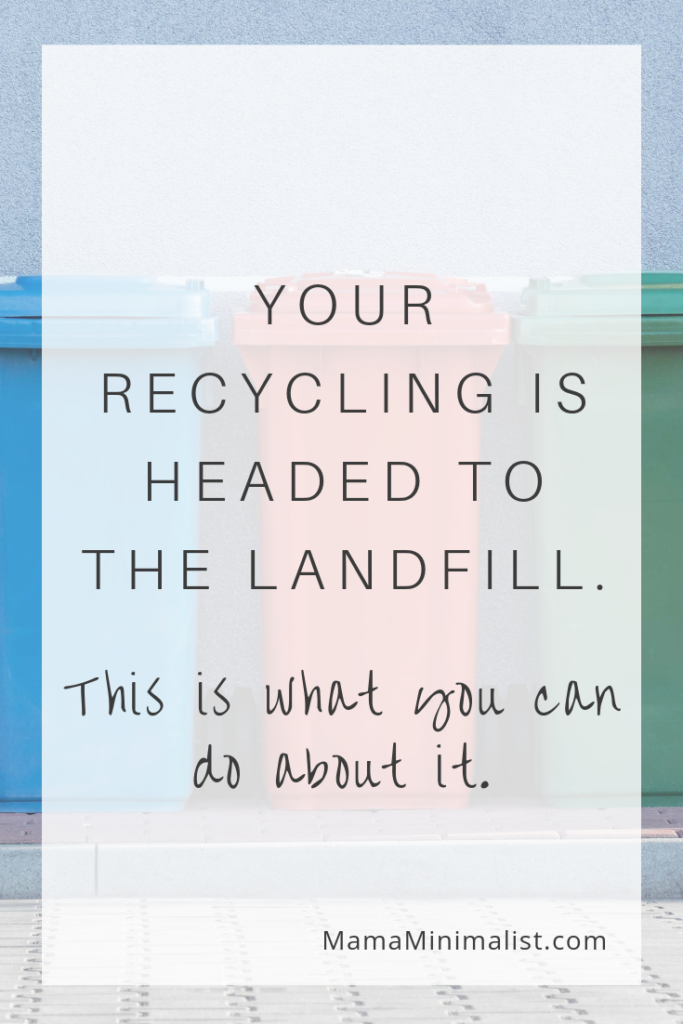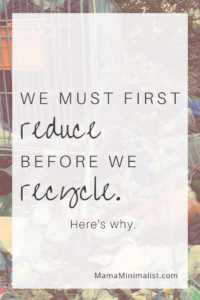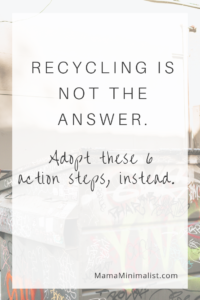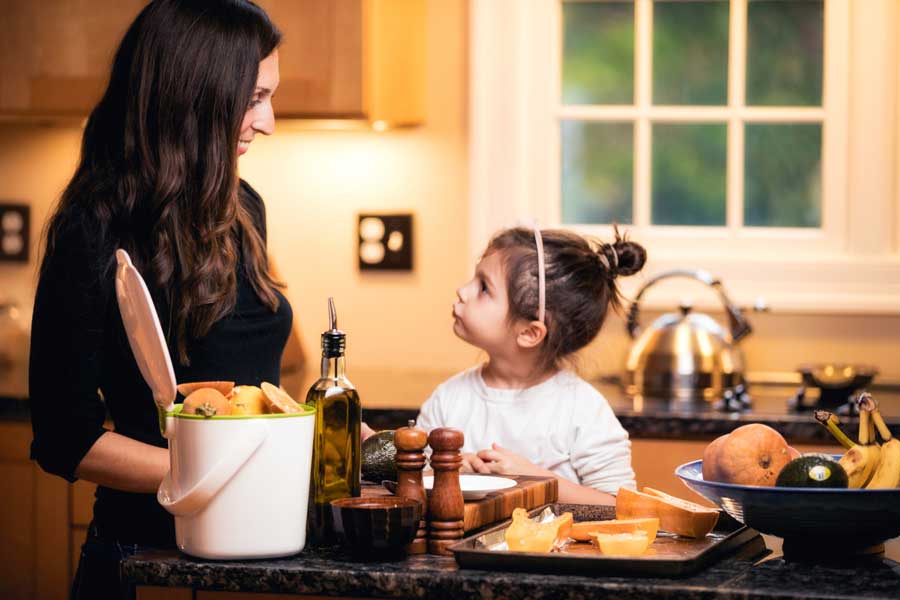Yes, Your Plastic Recycling is in Landfills
Is your recycled plastic in landfills?
A concerned citizen recently posted in my town’s community Facebook group, worried that the garbage company put her recycled plastic in landfills. She wrote:
May 6 at 8:13 AM
I just watched (my garbage man) empty my recycling into the same side of the truck as my garbage. Anyone else having this problem or notice if their garbage pickup company is sending recycling to landfills?
Others quickly chimed in: They had observed the same phenomenon on their respective curbs.
Some commenters were quick to defend the garbage company. Was the poster sure – absolutely sure – she saw what she thought she saw?
Had the driver pulled a lever to separate the bins?
Could the original poster be mistaken?
No, she knew what she had witnessed. She was so certain, in fact, she called her trash company.
Out of sight? Out of mind
_____
Most Americans have no idea what happens to their trash once the garbage collector loads it onto that oversized truck.
We assume our garbage is properly disposed of, and we expect that our recycling actually gets recycled.
We forget about our trash soon after the garbage truck grumbles down the lane. Out of sight + out of mind.
Thanks to decades-long efforts urging us to recycle, Americans are thrilled about the practice.
We recycle at home, at airports, at schools + in office buildings and feel at ease when we spy that 3-arrowed logo on our favorite products.
Most Americans sleep easy because they recycle. They convince themselves they do what they can for the environment.
And tossing that plastic yogurt container into the recycling bin instead of the trash? Doing so assuages any guilt associated with using that single-use item in the first place.
Recycling: An imperfect system
_____
Americans are wildly excited about recycling, but we shouldn’t be.
Here’s why:
1. Recycling has diverted public attention away from larger waste management reforms.
We’ve been so focused on recycling, we failed to do more. We’ve been short-sighted when the problem is so large it demands vision.
2. Recycling normalizes excessive consumption – particularly of single-use goods.
Because we recycle, we assume it’s A-OK to embrace disposability as a way of life.
In 2015, the most recent year for which national data are available, America generated 262.4 million tons of waste, up 4.5% from 2010 + 60% from 1985.
That amounts to nearly five pounds per person a day.
3. Recycling tricks us into viewing ourselves as responsible stewards of the planet.
The reality, however, is that we can + should be doing much more.
4. Americans are terrible at recycling.
We recycle unrecyclables. We clog sorting machinery with our plastic bags. Because we neglect to actually wash our jars, cans + plastic containers before tossing them in the bin, we ruin entire batches of perfectly good recycling.
We aren’t pragmatic; instead, we’re aspirational.
[Related: Are you recycling wrong? Identify the 9 most common recycling mistakes here.]
5. We don’t fully understand how recycling works.
Recycled plastic is actually downcycled; as a consequence, the resulting plastic is weaker than it once was.
Plastic is downcycled just 8 times before becoming garbage.
And then of course there’s reason #6: No one wants it.
The end of recycling; plastic in landfills, instead
_____
It used to be that China happily bought America’s paper + plastics. They imported bales upon bales of our poorly sorted recycling; a low-wage worker then sifted through our discards + set aside the most valuable items to be remade into shoes, handbags + other goods.
But the Chinese government restricted this policy in 2017; they eliminated it completely at the tail end of 2018.
Today, China no longer accepts foreign recyclables.
Fast forward to the post in my community Facebook group. Because China no longer wants our castoffs, U.S. waste companies are finding themselves stuck with the recycling that no one wants.
They’re also hit with new costs associated with processing trash + recycling. While overseas markets used to accept bales that included both dirty recyclables + unrecyclable trash, current domestic standards require that more time + labor be spent sorting all those items we threw into our recycling bins with the loftiest of expectations.
It’s expensive to recycle, so garbage companies in my sleepy town quietly cut corners by dumping recycling in landfills when they think no one’s watching.
And if contractors in my town are doing it, yours are, too.
Stay in-the-know!
Sign up for monthly eco-friendly inspiration.
The truth about trash
_____
Rural towns, oversized cities, remote ecosystems + our oceans (ahem … Great Pacific Ocean Patch) are increasingly crippled by the compounding effects of humanity’s trash problem.
America’s trash is either incinerated or dumped in a landfill. Plastic is in landfills, too. As citizens, we should be quite concerned with both options.
Incineration
Approximately 15% of America’s garbage is burned each year + with much controversy: Incineration spews dangerous smoke, gases + ash into the air we breathe.
Then there are landfills.
In her 2005 book, Gone Tomorrow, author Heather Rogers demystifies waste management in the United States.
She writes,
“There’s a reason landfills are tucked away, on the edge of town, in otherwise un-traveled terrain, camouflaged by hydroseeded, neatly tiered slopes. If people saw what happened to their waste, lived with the stench, lived with the scale of destruction, they might start asking difficult questions.”
Think landfills are benign? Think again:
– The toxic substances the average American household haphazardly trashes (batteries, televisions, nail polish + more) leach toxins into the soil + groundwater, thus polluting an area that extends far beyond the dump.
– Leachate, a highly toxic, sludge-like liquid that’s created when waste breaks down + mixes with water, pollutes soil + waterways.
– In the absence of oxygen, waste produces methane as it decomposes. Methane is a greenhouse gas that’s 25 times more potent than carbon dioxide + is a major player in climate change.
Dumping our recycling in landfills only compounds the above problems, with disastrous long-term effects.
Reduce, Reuse or Do Without
_____
The sad truth is this: Our recycled plastic is in landfills.
It’s high-time we end the charade by believing recycling is a sustainable, long-term solution.
We must not only explore but also embrace alternative disposal options like the ones outlined here.
Plastic in landfills? Here’s what you can do
_____
1. Avoid overbuying.
Although consumption is at the heart of economic health, consumption creates trash.
Purchase new only when you can’t acquire a needed item through an alternative means (borrowing, reusing, repairing or buying secondhand).
2. When you do buy, buy local.
Buying local goods saves on shipping materials + excess packaging.
3. Repair what’s broken.
We live in a society in which nearly everything is disposable. Because of our extreme wealth, we hardly flinch when our washing machine, let’s say, putters out after only a few years.
Don’t be so quick to chuck that washer. Repair the part that’s broken, instead.
Even better? Take pains before buying + be a conscious consumer: Buy quality; buy once.
4. Sell unwanted items.
We are less likely to trash items we paid for (as opposed to items we acquired for free).
Sell unwanted items to excited buyers even when your payout is small.
5. Compost what you can.
Composting fruits, vegetables + breads is old news. Did you know you can (+ should!) add cardboard, paper towels + napkins to your compost?
You can safely compost cotton clothing, Q-tips + dryer lint, too.
6. Say goodbye to single-use items, for good.
We use these items for minutes or seconds, then we throw them out: Tampons. Individually-wrapped snacks. Plastic bags. Make incremental steps toward eliminating single-use from both your life + your vocabulary.
(Unsure where to start? Click here for a list of easy sustainable swaps.)
If you’re wondering, the original poster succeeded in speaking directly with the owner of her garbage company. First, he was dubious that she saw what she claimed to have seen.
But when she persisted, he became apologetic.
He assured her that putting plastic in landfills wasn’t standard procedure; he promised to talk to his crew.
But I remain skeptical.





11 thoughts on “Yes, Your Plastic Recycling is in Landfills”
great post, people need to know the truth about recycling. Our family is working towards using less and eliminating plastic!
I completely agree! It’s amazing (in a terrible way) how ingrained plastic has become in daily life. My family, too, continues on the journey to drastically cut back on its use! Thank you for your efforts.
Interesting post about recycling 👍
Glad you enjoyed it!
We are working hard to reduce the amount of plastic in our lives! It’s tough, but it really needs to become a priority. Thanks for sharing this. ✌🏼💚
You’re welcome! And you’re right: Plastic is everywhere. Every step toward cutting plastic out is a tough one. Thank you for all you do!
Wow. What a convicting post Stephanie. Thank you for shedding light on this! So much of it, I had no idea about!
Thank you for the kind words! Happy to enlighten! 🙂
I try to keep up with changes to our recycling system and spread the word via a post to facebook, but i was not aware of the changes which leave waste management companies with recyclables and no true home for them. I have seen posts where things are made with plastics like roads and houses maybe some more research needs to be done to ways to use our own recyclables and educate people a ways to make it acceptable to do this Thankyou for the article to educate the consumer in us all, i try to do my part to leave a small footprint on earth.
Thank you for all you do, Frances! The world needs more people like you.
“Enjoyed” is hardly the word I’ use! I’m mad as ell right now, b/c I didn’t know this was going on!!
Comments are closed.